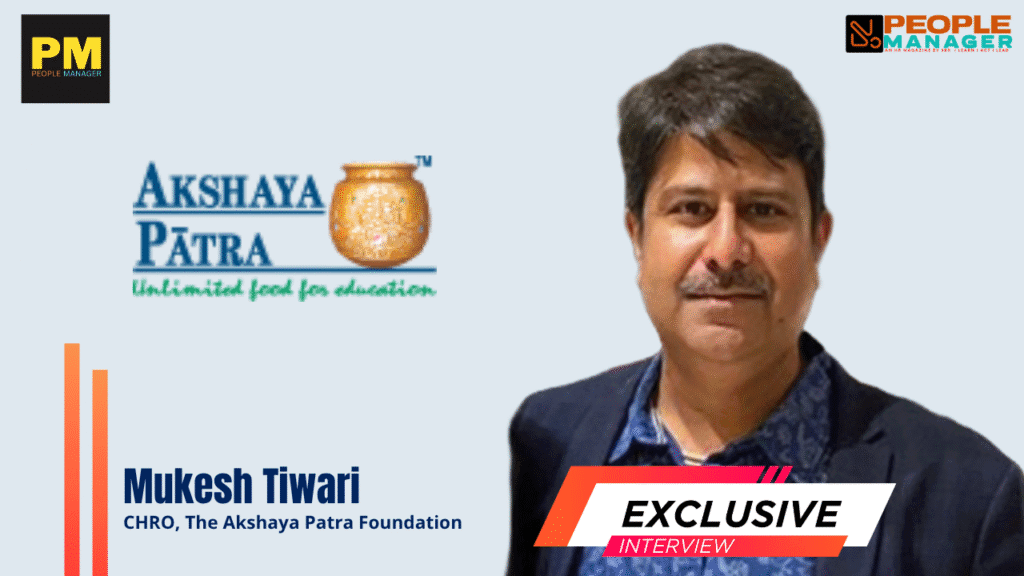Mukesh Tiwari on People Strategy Beyond Salary: Unlocking Purpose and Growth in the Social Sector
This model has enabled us to clock over 90,000 man-hours of structured training annually across the organization — a testament to our commitment to workforce development, especially among our frontline and blue-collar teams. By recognizing and incentivizing high performers, we’ve embedded a culture of continuous improvement that not only enhances productivity but also fosters purpose and pride in every role.

This interview with Mr. Mukesh Tiwari, the CHRO of The Akshaya Patra Foundation highlights their comprehensive approach to employee well-being and development within the social sector, emphasizing that organizational strength stems from the people. They detail how safety, emotional resilience, and financial stability are prioritized through various programs, alongside a blended learning model for continuous growth. The foundation also discusses their efforts in ethical recruitment, talent retention focused on purpose, and fostering a culture of diversity and inclusion. Ultimately, the future of workforce engagement in this sector is envisioned as being digitally enabled and focused on measurable impact rather than just hours worked.
Q. Employee safety is no longer limited to physical well-being. How does The Akshaya Patra Foundation adopt a holistic approach to employee welfare, especially in its kitchens and field operations?
Ans: At The Akshaya Patra Foundation, we believe that true organizational strength stems from the well-being of our people. Our commitment to employee welfare extends far beyond physical safety—it is an integrated approach encompassing emotional resilience, financial stability, and a culture of respect and empowerment.
Safety remains one of our core strategic imperatives, championed at the highest levels of leadership. We are steadfast in our mission to achieve an industry-leading benchmark of ZERO Lost Time Injuries (LTI) by 2030.
In our kitchens, where operational intensity is high, we have implemented rigorous hygiene and safety standards, complemented by regular training and internal audits. However, we recognize that well-being must be multidimensional. Our mental wellness programme, Mantra Care, provides access to counselling and stress management tools, while financial literacy is fostered through targeted initiatives like Kitchen Koach’s—equipping our teams with practical skills in budgeting and savings. Comprehensive health insurance and wellness checks further reinforce our safety net.
Whether an employee is part of our kitchen teams, logistics operations, or field outreach, our focus is unwavering: to ensure they feel safe, supported, and valued in every aspect of their professional journey with us.
Q. What operational challenges have you faced in maintaining consistent safety standards, and how have you addressed them?
Ans: With operations across diverse geographies, uniformity is a challenge. We’ve tackled this through periodic audits, localized safety-awareness programs, and a culture of continuous feedback. Recognizing that context matters, we customize safety practices while upholding our core standards. Most importantly, we’ve nurtured a sense of ownership among employees—safety isn’t a mandate; it’s a shared responsibility.
Q. How does your internal culture of safety enhance the foundation’s broader mission of community service?
Ans: Our service ethos begins with those who serve. A safe, supported employee is better positioned to serve the community with focus and compassion. Safety nurtures morale, which reflects in the quality and consistency of our service delivery. We view safety as both a human imperative and a strategic enabler for delivering impact at scale.
Q4. Many nonprofits struggle to balance productivity and employee development. How does Akshaya Patra integrate learning into daily operations?
Ans: At The Akshaya Patra Foundation, we view learning not as a separate function, but as an integral part of our operational fabric. We follow a blended learning model that harmonizes digital, experiential, and relational learning approaches.
Our e-learning platforms empower employees to learn at their own pace, while structured mentorship programs connect emerging talent with senior leaders, including members of our Board and executive leadership. This facilitates not just skill enhancement, but also values-driven leadership development.
The foundation of our approach is rooted in the 70:20:10 learning philosophy:
- 70% through on-the-job experiences — our kitchens, delivery networks, and daily operational challenges serve as real-time classrooms.
- 20% through coaching and mentoring — ensuring continuous guidance and personalized growth.
- 10% through classroom and formal training — providing the necessary theoretical grounding.
We proudly display the words “Every challenge is a classroom” in our training rooms, symbolizing our belief in lifelong learning at every touchpoint.
This model has enabled us to clock over 90,000 man-hours of structured training annually across the organization — a testament to our commitment to workforce development, especially among our frontline and blue-collar teams. By recognizing and incentivizing high performers, we’ve embedded a culture of continuous improvement that not only enhances productivity but also fosters purpose and pride in every role.
Q. Given the funding limitations in the non-profit sector, how do you ensure career progression for employees?
Ans: At The Akshaya Patra Foundation, career progression is rooted in purpose, not just position. We believe that limited resources should never limit growth. While the nonprofit sector may operate within financial constraints, we see career development as an investment in our mission and people—our most valuable asset.
Our approach to career planning is intentional and inclusive. Through structured programs like Leaders as Teachers, peer-led workshops, and cross-functional mobility, we empower employees to acquire new skills and broaden their impact. These initiatives foster a culture where learning is democratized, and leadership is nurtured at every level.
We are consciously moving towards a non-hierarchical model that emphasizes subject matter expertise and domain depth. Over the next two years, our focus is on cultivating specialized talent while preserving the collaborative ethos that defines TAPF.
Importantly, career development here is individualized. There is no one-size-fits-all pathway. Each plan is designed to:
- Bridge competency gaps aligned with future roles.
- Provide exposure across functions, geographies, or service lines.
- Adapt to the evolving aspirations and needs of the individual.
That said, career advancement is not automatic—even with a well-executed development plan. Our dynamic environment means priorities shift, and multiple individuals may be developing for the same leadership opportunity.
We have implemented a Sow–Ripen–Harvest model of succession planning. This model emphasizes mutual accountability: while the organization provides the tools and platforms for growth, employees take ownership of their journey. Our leaders play a crucial role in mentoring talent—building foundational skills, setting meaningful goals, and aligning aspirations with our mission of service.
At TAPF, career progression is ultimately defined not just by promotions but by purpose, contribution, and legacy. We encourage our people to grow with the vision, execute with values, and lead with the right attitude.
Q. How do partnerships with institutions and industry experts enhance your skilling efforts?
Ans: Partnerships with leading institutions and industry experts play a catalytic role in shaping our skilling ecosystem. These collaborations are not merely transactional—they are transformational.
For instance, our association with the Indian Federation of Culinary Associations (IFCA) has helped us refine our culinary protocols, ensuring that our kitchen practices align with the highest standards of hygiene, nutrition, and efficiency. Likewise, our partnership with Mahindra & Mahindra has significantly advanced our vehicle safety and logistics training modules, enhancing both operational excellence and driver welfare.
We also regularly host expert-led guest lectures, offer curated internships, and facilitate employee certifications through these alliances. Notably, professors from premier institutes like the Indian Institute of Management (IIM) have engaged in training sessions with our workforce, offering strategic insights that enhance leadership thinking and future-readiness across all levels of the organization.
These engagements not only inject fresh ideas into our systems but also deepen our culture of continuous learning, innovation, and excellence—ensuring we remain agile and relevant in a rapidly evolving world.
Q. How do your recruitment practices reflect Akshaya Patra’s commitment to sustainability and ethical hiring?
Ans: Our recruitment is values-driven. We prioritize local hiring to reduce environmental impact and boost community development. Our processes emphasize aptitude and alignment over legacy experience. We’re also deeply committed to gender equity and inclusion—every hire is seen as a long-term investment in our shared mission.
Q. Retaining mission-aligned talent in the non-profit world is tough. What’s your strategy for talent retention?
Ans: At The Akshaya Patra Foundation, purpose is our strongest anchor. While compensation structures in the non-profit sector may differ from the corporate world, what sets us apart is the deeper sense of fulfillment our employees derive from contributing to a transformative mission—nourishing children and nurturing futures.
Our talent retention strategy is holistic, rooted in the philosophy of engaging the head, heart, and hands of every employee. We’ve built an ecosystem where transparency, inclusion, and recognition are not just policies—they are part of our culture. Flexibility, wellness programs, learning opportunities, and meaningful work experiences form the pillars of our approach.
We strongly believe that “Who Cares, Wins.” That ethos drives our employee engagement strategy, championed across leadership and line functions. Retention, in our view, is a function of both rational and emotional commitment. The rationale includes tangible aspects such as career development, financial stability, and professional growth. The emotional aspect is more nuanced—how deeply employees connect with our values, how much they believe in their managers, teams, and the mission we collectively uphold.
In essence, we don’t just aim to retain talent; we aim to inspire it. By fostering a purpose-driven, emotionally intelligent, and growth-oriented workplace, we continue to build a resilient workforce dedicated to creating lasting social impact.
Q. Can you highlight specific inclusion efforts undertaken by Akshaya Patra?
Ans: At The Akshaya Patra Foundation, inclusion is not a policy—it is a principle that shapes our culture and drives our mission. Diversity and inclusion are deeply embedded in our organisational DNA, reflected in how we hire, engage, and grow our people across the country.
We actively conduct gender sensitization workshops and strictly implement the Prevention of Sexual Harassment (POSH) guidelines to create a safe and respectful workplace for all. Our recruitment practices are designed to reach underrepresented communities, ensuring a broad spectrum of voices are heard and empowered within the organisation.
To celebrate and cultivate our diverse talent, we have established Employee Resource Groups (ERGs) and conduct inclusive cultural celebrations that recognise the unique identities of our workforce. Our PAN-India Diversity Council serves as a strategic enabler, helping build an inclusive culture where employees feel valued for their individuality and can contribute meaningfully.
Inclusion is reinforced through continuous awareness sessions that promote respectful dialogue and shared learning. We believe that when people from varied backgrounds come together and bring their perspectives to the table, we unlock extraordinary innovation and impact.
Our teams across India embody the values of mutual respect and collaboration. Whether it’s in a remote kitchen or a corporate office, our people reflect the spirit of unity in diversity—delivering not just meals, but also dignity and hope. At Akshaya Patra, we don’t just manage diversity—we see it as a competitive advantage that strengthens our ability to serve with empathy and excellence.
Q. Finally, what is your vision for the future of workforce engagement in the social sector?
Ans: The future of workforce engagement in the social sector will be shaped by smart, ethical, and agile talent practices. We envision a digitally enabled ecosystem where app-based hiring, remote onboarding, and collaborative talent models—shared with forward-looking corporates—become the norm.
Flexibility will no longer be a benefit; it will be an expectation. Engagement strategies will be anchored in mental well-being, personal growth, and authentic volunteering experiences that align individual aspirations with organizational purpose.
Most importantly, the measure of performance will shift decisively from hours clocked to impact delivered. As the social sector matures, we must focus on attracting and retaining professionals who are driven not just by compassion, but by a commitment to measurable excellence. This convergence of purpose and performance will define the next generation of talent engagement.
Conclusion
Prioritizing people is essential to the future of the social sector, integrating safety, emotional resilience, and financial stability into a holistic employee welfare strategy. By embedding rigorous standards, mental wellness programs, and financial literacy initiatives, organizations foster a secure and supportive environment. Continuous learning and purpose-driven career growth ensure talent is developed with expertise and mission alignment, while retention is strengthened through transparency, inclusion, recognition, and flexibility. Inclusion is not merely policy but a guiding principle that drives innovation. Moving forward, workforce engagement will be shaped by ethical, agile talent strategies that leverage digital tools, prioritize well-being, and redefine success through impact rather than hours worked. For further insights into the evolving workplace paradigm, visit
- SHe-Box Portal Pushes Companies to Take Workplace Harassment Complaints Seriously: 2025 Report - February 16, 2026
- India’s Labour Codes Are Redrawing the Hiring Map- Tier III & IV Cities Emerge as the New Growth Engines: Report - February 11, 2026
- Girish Ramadurgam on Talent-Fitment” Problem: How to resolve the skill mismatch - January 19, 2026









This was a wonderful learning as a manager and also as an HR person. This has given an introsoection to where we are and an opportunity to think further and beyond, learn and improvise.
Also very proud to be a part of Mr. Mukesh Tiwari’s team where , everyday is learning and work is enjoyment. Being at workplace everyday is in itself a self motivation. Work, learning and enjoyment is in totality a holistic package here at Akshaya Patra.
Proud to work under your guidance Mukesh Sir.
This was a wonderful learning as a manager and also as an HR person. This has given an introsoection to where we are and an opportunity to think further and beyond, learn and improvise.
Also very proud to be a part of Mr. Mukesh Tiwari’s team where , everyday is learning and work is enjoyment. Being at workplace everyday is in itself a self motivation. Work, learning and enjoyment is in totality a holistic package here at Akshaya